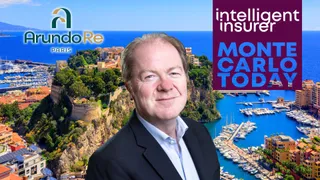
Sustainable pricing needed as climate change erodes diversification – Arundo Re CEO
After a spate of strong profits and growing pressure from cedents to push rates lower, a clear warning for reinsurers is emerging: beware the temptation of unsustainable cuts.
Key points:
Arundo turns a new page after CCR exit
Wildfires and floods undermine diversification
Sidecars useful, but no cure-all for risk
“Clients will use recent profits as an argument to push for decreasing rates,” Bertrand Labilloy, CEO of Arundo Re (formerly CCR Re), told Monte Carlo Today. “But nobody can dream of coming back to the conditions before the hardening market. Volatility is not pleasant; we have to think about sustainable prices and conditions, instead of playing power games.”
The first half of 2025 has already highlighted his point. “It was not cat free. Due to the huge wildfires in the US, the average level of cat claims is much higher than before.” That, he argued, made it essential to hold firm on terms. Cedents might point to balance sheet strength, but structural climate and macroeconomic risks mean stability should take precedence over competitiveness.
“Climate change jeopardises the benefits of geographical diversification.”
Arundo Re has been using alternative capital for seven years, and Labilloy sees clear value. “Sidecars and cat bonds are very useful, for high layers in cat towers or piloting balance sheet exposures. It’s definitely something all reinsurers should have in their toolbox.”
However, he cautioned against overstating their role. “ILS products are based on very precise modelling, so they cannot be extended to every type of risk (e.g. wildfires and cyber), but taken together, the ILS industry is part of the solution to meet demand.”
Perhaps his sharpest warning came on climate change. “From a technical point of view, climate change risks jeopardise the benefits of geographical diversification,” he said. “While it still helps for hurricanes and floods, secondary perils such as wildfires and flash floods are intensifying, so diversification works less well than before. We shouldn’t be over-optimistic about its long-term effects.”
Another evolution Labilloy highlighted was the shift in cedent needs. “To a certain point, there was the idea that reinsurance was there to cover extreme events,” he said. “More and more, clients want reinsurance to cover profit events as a way to reduce the volatility of their net income.”
That means product innovation. Demand for aggregate covers could surge again but will be considered only if well-defined aggregate covers rather than the opaque multi-country, multi-period structures of the past. “We should think about reintroducing delimited and transparent aggregates to better serve client needs, which are not only capacity, but also mitigating profit volatility.”
Such solutions, he stressed, required discipline in design, stronger modelling capabilities and a willingness to move beyond a “one-size-fits-all” approach.
The robotic revolution
While climate and capital may dominate debate at Monte Carlo, Labilloy sees a quieter revolution under way in the back office. “Robotics is very much implemented in our companies. It reduces cost and helps us be more reactive and analytical. We have all functions, including the treatment chain, supported by robots, which allows better proximity between accountants and underwriters, shorter delays and better service.”
Data, meanwhile, remains crucial for addressing climate-driven cat risk and demographic shifts in life insurance, but for Labilloy, it is “not a breakthrough tech”.
Monte Carlo 2025 is also a personal milestone. “We have a new name, Arundo. CCR has now fully exited, and with regulatory approvals in place, this marks the end of a long process. Ten years ago, I attended my first Rendez-Vous as CEO of CCR; today is my first as CEO of Arundo, with no link at all to CCR. We are writing a new chapter in our history, and the team is very proud.”
Labilloy is, however, under no illusion about the uncertainty facing the industry, especially the “macroeconomic and financial” situation of debt, inflation and global growth.
“We must not make the same mistake as in 2022, when we were all taken by surprise by the surge of inflation. With tariff increases adding pressure, the impact could be significant.
“Monte Carlo is the place where people from across the world meet to understand these risks, and it will be very interesting to hear their views.”
That, ultimately, is the balance Labilloy wants the market to strike – innovation and new capital tools, yes, but always anchored in sustainable pricing and realistic expectations of risk.
Bertrand Labilloy is the chief executive officer of Arundo Re. He can be contacted at: blabilloy@arundore.com
For more news from Monte Carlo Today, click here.
Did you get value from this story? Sign up to our free daily newsletters and get stories like this sent straight to your inbox.
Editor's picks
Editor's picks
More articles
Copyright © intelligentinsurer.com 2024 | Headless Content Management with Blaze

.jpg/r%5Bwidth%5D=320&r%5Bheight%5D=180/edfafa60-033e-11f1-9c59-55fae760c8d6-II%20News%20-%20Aditi%20(10).webp)